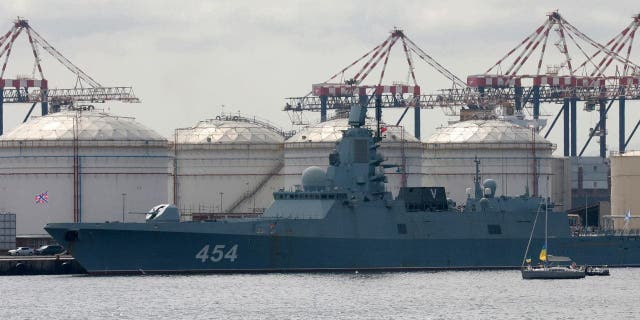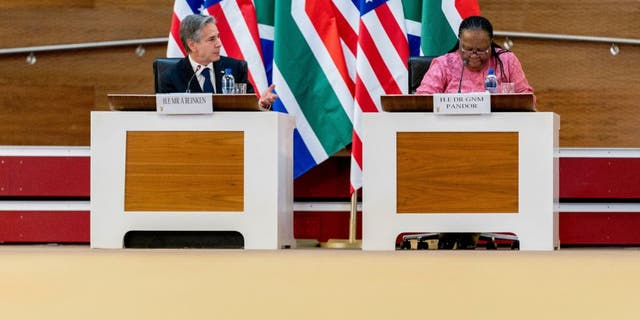JOHANNESBURG, South Africa — It’s perhaps one of the biggest diplomatic disputes ever between the U.S. and South Africa, raising new questions Friday, tanking the local currency market, threatening thousands of African jobs and still not providing definitive answers on whether South Africa has, as has been reported, become “a rogue state” and supplied arms to Russia.
Reuben Brigety, U.S. Ambassador to South Africa, was summoned to meet with South Africa International Relations Minister Naledi Pandor Friday over Brigety’s claim South Africa supplied arms to Russia.
At a news conference Thursday, the U.S. ambassador claimed weapons and ammunition were loaded onto a Russian freighter at Simonstown, a naval base near Cape Town.
“We are confident that weapons were loaded into that vessel, and I would bet my life on the accuracy of that assertion,” Brigety told reporters. “The arming of the Russians is extremely serious, and we do not consider this issue to be resolved. And we would like (South Africa to start) practicing its non-alignment policy.”
Russian President Vladimir Putin, left, with South African counterpart Cyril Ramaphosa. The U.S. Ambassador to South Africa has accused Ramaphosa’s government of supplying weapons to Russia. (Sergei Chirikov/Pool Photo via AP, File)
US AMBASSADOR ACCUSES SOUTH AFRICA OF ARMING RUSSIANS
Local currency markets plunged on the news. Earlier Friday, the rand dropped to its lowest level ever against the U.S. dollar after a South African government official tweeted, “The National Conventional Arms Control Committee has no record of an approved arms sale by the state to Russia related to the period/incident in question.”
The tweet was posted by Clayson Monyela, head of public diplomacy at Pretoria’s Department of International Relations.
Later, Monyela was back on Twitter, confirming that a meeting between his boss, Minister Naledi Pandor, and the U.S. ambassador had taken place.
“We conveyed our displeasure with his conduct and he admitted that he crossed the line and apologized unreservedly,” Monyela wrote.
The ambassador later appeared to eat diplomatic humble pie, tweeting: “I was grateful for the opportunity to speak with Foreign Minister Pandor this evening and correct any misimpressions left by my public remarks. In our conversation, I re-affirmed the strong partnership between our two countries & the important agenda our Presidents have given us.”
Asked for a comment by Fox News Digital, the State Department referred Fox News Digital to the ambassador’s tweet.
Pandor also talked with Secretary of State Antony Blinken. There was no word on whether South Africa lodged a protest over the ambassador, but State Department spokesperson Matthew Miller said, in the meeting, “Secretary Blinken underscored the importance of the U.S.–South Africa strategic partnership and reiterated cooperation on shared priorities.”
Some of Pandor’s government colleagues went to Washington just under two weeks ago to try to persuade the U.S. not to cut trade incentives with South Africa over Pretoria’s position. It has repeatedly called Russia “friends” and has abstained at the United Nations on several occasions from condemning Russia’s invasion of Ukraine.
US-AFRICA LEADERS SUMMIT: WASHINGTON ‘PLAYING CATCH-UP’ WITH RUSSIA AND CHINA
President Ramaphosa’s office released a statement adding that more went on in Washington than was at first reported.
“In recent engagements between the South African delegation and U.S. officials, the Lady R matter was discussed, and there was agreement that an investigation will be allowed to run its course and that the U.S. intelligence services will provide whatever evidence is in their possession,” the statement said.

People on a yacht, right, protest against the Russian frigate Admiral Gorshkov docked in the Cape Town harbor of South Africa Feb. 14, 2023. (AP Photo/Nardus Engelbrecht)
Observers believe the South Africans were angered the ambassador spoke publicly about the Russian cargo ship, and that is why Monyela also tweeted, “There’s a commitment to use established diplomatic channels to raise whatever issue may arise in the management of the bilateral relations between the two countries.”
CLICK HERE TO GET THE FOX NEWS APP
A question remains. Why, when there’s state-of-the art cargo terminals available at Cape Town’s port, was a sanctioned Russian freighter allowed to dock at a South African naval base?
A State Department spokesperson stoked the fire on this issue at a briefing this week, telling reporters, “The U.S. has serious concerns about the docking of a sanctioned Russian cargo vessel at a South African naval port in December of last year.”
Weapons or no weapons, analysts say South Africa will have to change its viewpoint on Putin’s Russia if it wants to save the thousands of jobs tied to the U.S. AGOA trade agreement, which allows for the duty-free import of a wide range of items from cars to oranges into the U.S. market.

South Africa’s Foreign Minister Naledi Pandor (R) and Secretary of State Antony Blinken (L) attend a strategic dialogue opening session meeting at the South African Department of International Relations and Cooperation in Pretoria, South Africa, on August 8, 2022. – Blinken is on a ten day trip to Cambodia, Philippines, South Africa, Congo, and Rwanda. (Photo by Andrew Harnik / POOL / AFP) (Photo by ANDREW HARNIK/POOL/AFP via Getty Images)
Monyela, on Twitter again, reported that there will be an inquiry into whether arms were supplied to Russia.
“The inquiry, initiated by HE President Cyril Ramaphosa, will be a platform to establish facts and role players in the incident in question,” he tweeted.
This has raised another question from observers and opposition politicians. This is a tiny navy base, capable of only handling a handful of ships. Why couldn’t President Ramaphosa simply ask his defense minister to tell him — if he doesn’t know — what happened with the Russian ship?
The leader of the opposition, the Democratic Alliance’s John Steenhuisen, put into words the fears of many when he addressed Ramaphosa in Parliament here Thursday.
“South African arms and ammunition could have been used to slaughter innocent civilians,” Steenhuisen told the South African president. “My question is simply this: how do you face the world and how do you sleep at night?”